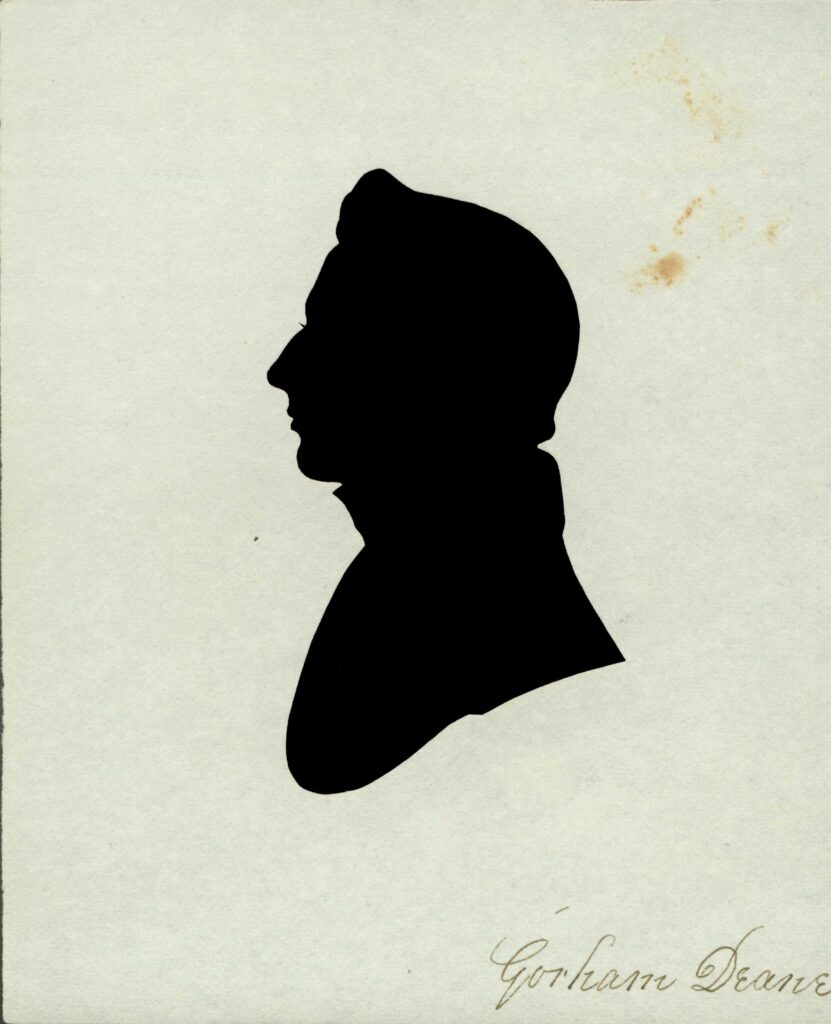
The Sarcastic Salutatorian
Gorham Deane was born at Biddeford, ME, in 1803. His father was a doctor named Ezra Deane, he had two brothers named Charles and Ezra, and a sister named Lucia. Growing up in Biddeford, his father wanted to turn him into a businessman and twice got him a job at a local store. However, Deane was continually drawn to his first and only love: reading. While on a shift, he would “get absorbed in some book” and lose all sense of his surroundings. Eventually, it became clear to everyone that Deane was destined for a college education. Before entering Bowdoin he taught high school in Kennebunkport and Baldwin, ME.
Deane matriculated with the Class of 1825 at the age of 18, and boarded at Mr. J. Grow’s with Charles Jeffrey Abbott. Deane had a difficult first semester at Bowdoin. In a letter to his brother from November 1821, Deane writes how Brunswick is “a very unsocial place” with few women, and how he had even fewer hopes of catching one: “Nothing less than a tutor will satisfy the Brunswick ladies.” He goes on to describe how he managed to “outrageously offend” a number of his classmates and feared that he may soon make the newspaper’s obituary section. Deane was, in fact, known for “freely censuring the faults of others” with bitter sarcasm, so this likely was not the only time he found himself in hot water with his peers. One semester later, Deane witnessed the fire that burned Maine Hall to the ground. He tried to carry a bucket of water up the stairs but the flames and smoke proved so injurious that he had to turn back. Deane also suffered a number of physical ailments during his first year. By Deane’s sophomore year, however, things seemed to start looking up. He made some good friends in George Washington Pierce and Henry Wadsworth Longfellow and started boarding at Captain McLellan’s, which he found favorable to his first year’s residence. At McLellan’s, Deane seemingly became close with James Ware Bradbury, who he roomed with in Winthrop Hall his junior year. He also had a social outlet in the Peucinian society. Senior year, Deane lived by himself at Captain McLellan’s.
There is no doubt that Deane was one of the most talented and passionate members of the Class of 1825. Everyone who knew him wrote about his love of learning. One could often find him bent over a stack of books comparing the opinions of different authors. Every subject that he studied he approached with equal fervor. A classmate of his reflected on how Deane, “used to run from room to room proclaiming how little time he needed for lessons and then would stay up late to make due for all the lessons he was cutting short.” With all the time that Deane spent on study, he had little time for mischief. He had all of one unexcused absence throughout college and his biggest role model was an upperclassman who reprimanded other students for staying up too late. This was an example Deane was soon to follow, as he was known to threaten card players and those breaking other college rules. Overall, Bowdoin rewarded Deane’s hard-work and penchant for obedience. He was awarded the position of salutatorian at both his senior Class Exhibition and Commencement. Deane hoped to channel his academic success into a career in the ministry.
However, Deane’s academic achievements were accompanied by physical consequences. The illness which had afflicted the scholar during his first year at Bowdoin returned and worsened when he was an upperclassmen. Eventually, it became clear that Deane had contracted tuberculosis. Many sleepless nights spent studying and a lack of exercise only worsened this condition. By the end of his senior year, Deane was seriously ill. Shortly after he received the rank of salutatorian he was forced to withdraw from Bowdoin. Deane travelled to Providence, Rhode Island, in the hopes of convalescing, but it was no use. He passed away on August 11, 1825, just a few short days before he was due to graduate. Deane’s death was devastating for the Bowdoin community. One student wrote that, “He was my classmate. I loved him as a brother; I weep over him as an invaluable friend.” Out of respect, no one took Deane’s speech at Commencement and President Allen made special mention of him at the proceedings. It is unknown what future this sarcastic, passionate and beloved man might have had if he had lived beyond 22. Some scholars also believe that Deane may have been Nathaniel Hawthorne’s inspiration for his character Fanshawe, a college student who dies from overwork.